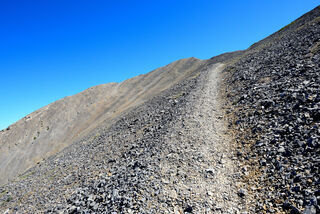Beauty
Do You Feel Like You’re Climbing a Scree Field?
The pandemic can make you feel like you're climbing on small, loose stones.
Posted August 24, 2020 Reviewed by Lybi Ma
In 1996, I competed in the second Eco-Challenge, an adventure race founded and recently revived by Mark Burnett. We felt energized struggling over glaciers and swimming against the current in an icy river; the only demoralizing experience was climbing a scree field. Other challenges we faced made our hearts race and filled our eyes with wonder—we had the breathtaking beauty of British Columbia all around us. This climb had no beauty and my heart wasn’t in it.
The scree field was a steep slope covered in shards of loose gray rock. You can try running, stepping carefully, and angling your feet as though you were in second position in ballet—feet are in a parallel line, separated and turned outward. No matter what you do, at some point, the scree robs you of upward movement. You eventually get to the top of the slope, but probably not without surges of frustration and anger all along a trek where there seems to be no end in sight.

That’s it. That’s where we are now. With no one but our “teammates” to help us find hope.
The scree field metaphor occurred to me after a recent “social” event I attended. Seven old friends sat outside in a circle of chairs placed six- to eight-feet apart. We shared snacks and drinks just as we did pre-covid, except that we didn’t hug “hello” and we weren’t going to hug “goodbye.”
One of those in the group—known for her skepticism about mask-wearing—said defiantly that she did not want to live in fear. Following the “rules” did not suit her. Her comment was angry and it sliced through the connection with us at a time when we hoped that coming together would make us feel normal, healthy, and loved.
Not wanting to be confrontational, I thought, but did not say out loud: “This is not about fear as much as it is about the unrelenting ache of uncertainty.”
Neuroendrocrinologist Robert Sapolsky—one of the most entertaining lecturers I have ever heard—published an opinion piece with CNN on August 22 entitled, “Why our brains are having so much trouble with COVID-19.” I may have had the same thought the previous day that he expressed in his piece, but he’s an actual authority on having such thoughts, so I quote him.
It’s worth examining how the wreckage [of COVID-19] has also been made worse by a feature of our psyches—namely, how poorly we handle ambiguity.
Dr. Sapolsky draws a sharp distinction between risk and ambiguity, noting:
People vary dramatically as to how willing they are to take a risk, and some people thrive on it. In contrast, people consistently hate ambiguity.
Back to the Eco-Challenge. When I competed in the first one in 1995, which was held in southern Utah, one segment was the largest rope course in the world. It began with a 440-foot free rappel—that means a competitor descending on a rope that is touching nothing but air. Climber, dangling rope, and ground: there is nothing ambiguous about that. There is no “if.” Either you get safely to the ground, or you spend the rest of eternity attached to a rope suspended over an unforgiving floor of rock and cactus (or until Mark Burnett could send someone to retrieve you).
There was also no ambiguity in the chance to take a high-risk task and turn it into one of the most memorable moments of my lifetime. My team captain saw how afraid I was early on in the rappel and he called over to me from the adjacent rope: “Look at the view!”
I swiveled around and saw astonishing beauty, with miles of color, rock formations, and endless blue sky. My perspective wasn’t the same for the rest of the race. I knew I would make it to the finish line with my four teammates.
Is it possible to take our highly ambiguous, day-to-day circumstances and find something like that—something so certain, so centering, so joyful that there is a way forward as a “team”?
Dr. Sapolsky ended his opinion piece urging people to turn the horror of ambiguity into a more certain set of circumstances. Take a calming breath, think about what you know for certain about the virus, and turn away from the idea you are a helpless hostage.
To whatever extent you can, move away from ambiguity. Connect with people you trust and listen to them when they remind you to “Look at the view!”
The scree is a temporary annoyance. Your “teammates” and what they offer you are enduring sources of optimism and joy.
References
Sapolsky, Robert M. PhD, “Why our brains are having so much trouble with Covid-19,” CNN Opinion, August 22, 2020
Sometimes you're not so sure you'll ever reach the top. Source: Eric M. Williams/Shutterstock



